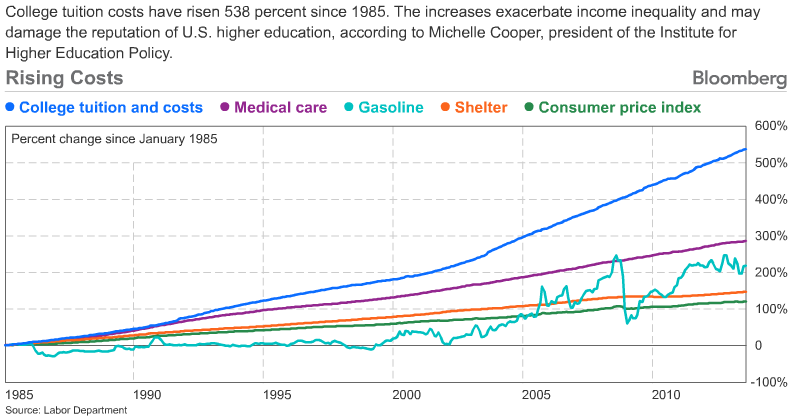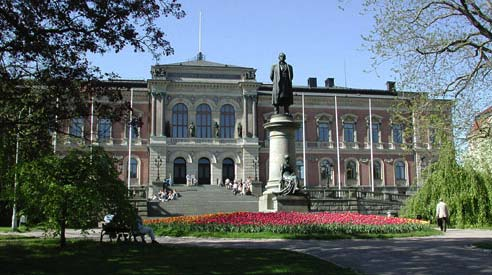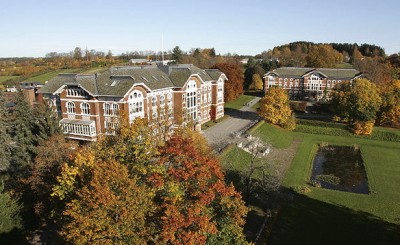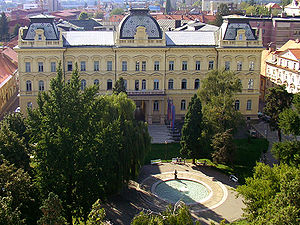It looks like you're using an Ad Blocker.
Please white-list or disable AboveTopSecret.com in your ad-blocking tool.
Thank you.
Some features of ATS will be disabled while you continue to use an ad-blocker.
Six countries where Americans can study at universities, in English, for free (or almost free)
page: 128
share:
Considering how little I gave a crap about school and my choice to follow a "higher" education, if you catch my drift, I managed to pass through as
an A/B student. College seemed like the obvious next step in securing my future and possibly raising a family.
Fast forward thirteen years and here I am still, no college diploma. I have seen friends of mine go through the grind and pursue what they thought was a sure thing only to be left with massive debt and nothing to show for it. Ironically, I make more than many of them. Hard work, the willingness to learn and a good attitude has been my secret to success.
But what if college was free here in America? Surely, if we weren't spending $337 million per day on fruitless endeavors as pointed out by another poster on this site, we could easily fund the entire American school system. In fact, all it would take is less than seventy billion dollars a year!

Here's Exactly How Much the Government Would Have to Spend to Make Public College Tuition-Free
Instead, the increase in costs to operate our colleges and universities has been repeatedly shifted onto those seeking to further their education as tuition fees have surged over 500% since 1985.

Our education has devolved into another parallel system of rich entrepreneurs and a slave class who could barely afford to work underneath them. Public schools fund nearly 75% of undergrads and those remaining 25% will be your future masters.
The conspiracy is why we all aren't given a fair opportunity to become something more. Those in power would never swim in a pond with all the same size fish. They would eventually starve and succumb to the same cold plate of food the rest of us Americans have a hard time swallowing. There would be greater competition and less domination, overall producing a better product and societal outcome.
Let's take a look at the surprising and very cheap alternatives there are to pricey American college degrees. Below are seven countries that offer American courses for little or no cost at all. As a note, relocating and trying to keep your sanity in a foreign land does have it's difficulties. Where there is will, there is a way.
Germany

Finland

France

Sweden

Norway

Slovenia

Knowledge is power.
Fast forward thirteen years and here I am still, no college diploma. I have seen friends of mine go through the grind and pursue what they thought was a sure thing only to be left with massive debt and nothing to show for it. Ironically, I make more than many of them. Hard work, the willingness to learn and a good attitude has been my secret to success.
But what if college was free here in America? Surely, if we weren't spending $337 million per day on fruitless endeavors as pointed out by another poster on this site, we could easily fund the entire American school system. In fact, all it would take is less than seventy billion dollars a year!

Here's Exactly How Much the Government Would Have to Spend to Make Public College Tuition-Free
Instead, the increase in costs to operate our colleges and universities has been repeatedly shifted onto those seeking to further their education as tuition fees have surged over 500% since 1985.

Our education has devolved into another parallel system of rich entrepreneurs and a slave class who could barely afford to work underneath them. Public schools fund nearly 75% of undergrads and those remaining 25% will be your future masters.
The conspiracy is why we all aren't given a fair opportunity to become something more. Those in power would never swim in a pond with all the same size fish. They would eventually starve and succumb to the same cold plate of food the rest of us Americans have a hard time swallowing. There would be greater competition and less domination, overall producing a better product and societal outcome.
Let's take a look at the surprising and very cheap alternatives there are to pricey American college degrees. Below are seven countries that offer American courses for little or no cost at all. As a note, relocating and trying to keep your sanity in a foreign land does have it's difficulties. Where there is will, there is a way.
Germany

Germany's higher education landscape primarily consists of internationally well-ranked public universities, some of which receive special funding because the government deems them "excellent institutions." What's more, Americans can earn a German undergraduate or graduate degree without speaking a word of German and without having to pay a single dollar of tuition fees: About 900 undergraduate or graduate degrees are offered exclusively in English, with courses ranging from engineering to social sciences. For some German degrees, you don't even have to formally apply.
Finland

This northern European country charges no tuition fees, and it offers a large number of university programs in English. However, the Finnish government amiably reminds interested foreigners that they "are expected to independently cover all everyday living expenses." In other words: Finland will finance your education, but not your afternoon coffee break.
France

There are at least 76 English-language undergraduate programs in France, but many are offered by private universities and are expensive. Many more graduate-level courses, however, are designed for English-speaking students, and one out of every three French doctoral degrees is awarded to a foreign student.
"It is no longer needed to be fluent in French to study in France," according to the government agency Campus France. The website studyportals.eu provides a comprehensive list of the available courses in France and other European countries.
Public university programs charge only a small tuition fee of about 200 dollars for most programs. Other, more elite institutions have adopted a model that requires students to pay fees that are based on the income of their parents. Children of unemployed parents can study for free, while more privileged families have to pay more. This rule is only valid for citizens of the European Union, but even the maximum fees (about $14,000 per year) are often much lower than U.S. tuition fees. Some universities, such as Sciences Po Paris, offer dual degrees with U.S. colleges
Sweden

This Scandinavian country is among the world's wealthiest, and its beautiful landscape beckons. It also offers some of the world's most cost-efficient college degrees. More than 900 listed programs in 35 universities are taught in English. However, only Ph.D programs are tuition-free.
Norway

Norwegian universities do not charge tuition fees for international students. The Norwegian higher education system is similar to the one in the United States: Class sizes are small and professors are easily approachable. Many Norwegian universities offer programs taught in English. American students, for example, could choose "Advanced Studies for Solo Instrumentalists or Chamber Music Ensembles" or "Development Geography."
But don't expect to save money in Norway, which has one of the world's highest costs of living for expats. And be careful where you decide to study. "Winters in general are quite different in different parts of the country, with the north having hard, arctic winters, and the southwest mostly having mild, wet average European winters," the Norwegian Center for International Cooperation in Education notes.
Slovenia

About 150 English programs are available, and foreign nationals only pay an insignificant registration fee when they enroll. Slovenia borders Italy and Croatia, among Europe's most popular vacation destinations. However, Times Higher Education, a weekly magazine based in London, did not list one Slovenian university in its recent World University Ranking.
Knowledge is power.
You forgot Cuba - especially in the Medical Arts where they excell.
originally posted by: FyreByrd
You forgot Cuba - especially in the Medical Arts where they excell.
This thread is based off of an article from the Washington Post. It actually listed seven countries, but due to space limitations I decided to cut it down to six. I did not compile this list myself.
Anyways, thank you for your addition. Links would be helpful for anyone interested. I encourage any other members to add anything the article may not have mentioned.
Star and flag, thanks for the heads up.. I'll be living in germany for the next 4 years most likely unemployed during this time.
No!!!
I pray to the god of democracy Thomas Jefferson to save the United States from the pain that this socialism is trying to exert on our uneducated and naive population! Do not be tricked by the temptations of free education, it will only lead to understanding, and enlightenment! You will not be able to be satisfied once you are able to understand the world around you! Remain ignorant, for your own good!
I pray to the god of democracy Thomas Jefferson to save the United States from the pain that this socialism is trying to exert on our uneducated and naive population! Do not be tricked by the temptations of free education, it will only lead to understanding, and enlightenment! You will not be able to be satisfied once you are able to understand the world around you! Remain ignorant, for your own good!
originally posted by: xuenchen
originally posted by: FyreByrd
You forgot Cuba - especially in the Medical Arts where they excell.
Does Cuba have English courses?
Cuba offers relatively cheap tuition and those seeking to make a career in the medical field will likely get full scholarship. I had to edit because I initially thought they tought these courses in English but apparently they do not.
All classes are taught in Spanish; but a semester-long Spanish language intensive is offered to students who need it (prior to first year), along with a pre-med semester in which students can review pre-med sciences and improve their fluency in Spanish.
For those still interested...
Earn a Medical Degree on Full Scholarship in Cuba
Applicants should:
•Be US citizens (with US passport)
•Be between the ages of 18 and 25
•Have completed college-level pre-med science courses (one year each of biology, inorganic chemistry, organic chemistry, and physics, each with laboratory)
•Be physically and mentally fit
•Come from the humblest and neediest communities in the US
•Be committed to practice medicine in poor and underserved US communities after graduation
Applicants will be carefully selected by the IFCO Medical School Advisory Committee, based on applications, transcripts, interviews, letters of reference, etc. Final admissions decisions will be made by administrators of the Latin American School of Medicine and the Cuban Ministry of Public Health.
Oh the irony!
The offer to US students was made because of Cuba's recognition that millions in the US have little or no access to affordable health care; and that many young people in the US don't even dare to dream of studying medicine because of the economic costs.
I hope this encourages people to look into the field of medicine. Just don't go all big brotherish on us after you graduate. Help cure the disease that is the American medical industry!
edit on 10-1-2015 by eisegesis because: (no reason given)
I am reading Isaac Asimov again.
he has a story about a telepathic robot.
the many story's are about a lot of things.
But in the far future (22,500 years)
a world called trantor.
is ware the 0.001% Rich live.
witch feeds off Millions of worlds.
the pore? they just farm or mine.
they Die at 60. a pension of a painless death.
did Asimov Know the future?
we are just about their now!
he has a story about a telepathic robot.
the many story's are about a lot of things.
But in the far future (22,500 years)
a world called trantor.
is ware the 0.001% Rich live.
witch feeds off Millions of worlds.
the pore? they just farm or mine.
they Die at 60. a pension of a painless death.
did Asimov Know the future?
we are just about their now!
Great thread on a meaningful topic. The prohibitive cost of getting a “higher education” in this country has laid waste to countless talented
contributors to this country’s growth. And it shows in every facet of our society. We’re steadily falling behind in areas we once dominated
(science, technology, etc). Our society, culture and governmental process was once the envy of much of the world, but not anymore. We still have the
deepest pockets within the corporate realm, and yet income inequality continues to grow as our once thriving middle class rapidly declines.
I can recall in my own lifetime when the American educational system was not only considered world class, but was also quite affordable. I was able to get a B.S. degree from a major university without incurring one nickel of debt, and with no outside support (no rich parents to lend a hand). I worked my butt off, slept maybe 4-5 hours/day and rarely had a minute to spare, but none the less it was manageable. Man, things have changed. I can’t imagine going to school today and getting a “decent” education without incurring a $100,000 debt. It’s a cryin’ shame.
I wish I had the answers, but I don’t. It seems we as a nation could use an attitude adjustment. Maybe a little more emphasis on Democracy, and a little less on Capitalism. And a good education for all would be a giant leap in the right direction.
I can recall in my own lifetime when the American educational system was not only considered world class, but was also quite affordable. I was able to get a B.S. degree from a major university without incurring one nickel of debt, and with no outside support (no rich parents to lend a hand). I worked my butt off, slept maybe 4-5 hours/day and rarely had a minute to spare, but none the less it was manageable. Man, things have changed. I can’t imagine going to school today and getting a “decent” education without incurring a $100,000 debt. It’s a cryin’ shame.
I wish I had the answers, but I don’t. It seems we as a nation could use an attitude adjustment. Maybe a little more emphasis on Democracy, and a little less on Capitalism. And a good education for all would be a giant leap in the right direction.
a reply to: darkbake
Its kind of strange how life plays out, right? "Successful" is one of the most subjective words that I know of. About six years ago, I changed my entire outlook on life and my small but perpetual successes have led me to believe that life isn't about who or what you know, its how you apply yourself to any given situation to create the best outcome. The rest falls into place.
Its kind of strange how life plays out, right? "Successful" is one of the most subjective words that I know of. About six years ago, I changed my entire outlook on life and my small but perpetual successes have led me to believe that life isn't about who or what you know, its how you apply yourself to any given situation to create the best outcome. The rest falls into place.
In the England the tuition fees have increased from average £3K to many fees of £6K /£9K, and are a few thousand more for non UK nationals.
Scotland has free courses for nationals.
There were also rogue organisations exploiting a loop in the system that certain foreigners used, for extending their stay after their student visa.
I often consider moving to somewhere where the lifestyle is more appealing, Sweden always figures high on the list and if the Phd study is free, it just got higher on the list.
Scotland has free courses for nationals.
There were also rogue organisations exploiting a loop in the system that certain foreigners used, for extending their stay after their student visa.
I often consider moving to somewhere where the lifestyle is more appealing, Sweden always figures high on the list and if the Phd study is free, it just got higher on the list.
edit on 10-1-2015 by theabsolutetruth because: (no reason given)
originally posted by: netbound
Great thread on a meaningful topic. The prohibitive cost of getting a “higher education” in this country has laid waste to countless talented contributors to this country’s growth. And it shows in every facet of our society. We’re steadily falling behind in areas we once dominated (science, technology, etc). Our society, culture and governmental process was once the envy of much of the world, but not anymore. We still have the deepest pockets within the corporate realm, and yet income inequality continues to grow as our once thriving middle class rapidly declines.
I can recall in my own lifetime when the American educational system was not only considered world class, but was also quite affordable. I was able to get a B.S. degree from a major university without incurring one nickel of debt, and with no outside support (no rich parents to lend a hand). I worked my butt off, slept maybe 4-5 hours/day and rarely had a minute to spare, but none the less it was manageable. Man, things have changed. I can’t imagine going to school today and getting a “decent” education without incurring a $100,000 debt. It’s a cryin’ shame.
I wish I had the answers, but I don’t. It seems we as a nation could use an attitude adjustment. Maybe a little more emphasis on Democracy, and a little less on Capitalism. And a good education for all would be a giant leap in the right direction.
In a class I was teaching recently there were a bunch of 18 year olds. Each of them had between 25k and 45k in debt just for one or two years of college at that point. None of them had any perspective on just how big a hole they were in.
It's not "free". Someone has to pay for it, and that person is being forced to do so (through enforcement by the IRS or other government
agency).
The end user doesn't have to pay, thus it's "no charge" to the end user, using the money that some other person earned.
The end user doesn't have to pay, thus it's "no charge" to the end user, using the money that some other person earned.
We spend the money here anyway, thats the whole point.
I'd rather my tax dollars go to stuff like this, then wars, weapons development, pocket-lining, the drug war, welfare for illegal immigrants, etc.
Is it really that hard to understand all of this?
reply to: LanceCorvette
I'd rather my tax dollars go to stuff like this, then wars, weapons development, pocket-lining, the drug war, welfare for illegal immigrants, etc.
Is it really that hard to understand all of this?
reply to: LanceCorvette
new topics
-
Anti-Government Protest in Serbia
Social Issues and Civil Unrest: 53 minutes ago -
The Effects of Electric Fields and Plasma on Plant Growth
Science & Technology: 1 hours ago -
The Daily Mail trying to imply “it’s aliens”
Dissecting Disinformation: 8 hours ago -
Swarms of tiny 'ant-like' robots lift heavy objects and navigate obstacles
Science & Technology: 10 hours ago -
NYPD Chief Jeffrey Maddrey Resigns - Forced Officers to Give Sex for Overtime Pay and Favors.
Posse Comitatus: 11 hours ago
top topics
-
The Carpet Coating that Attacked the Environment
Medical Issues & Conspiracies: 15 hours ago, 15 flags -
NYPD Chief Jeffrey Maddrey Resigns - Forced Officers to Give Sex for Overtime Pay and Favors.
Posse Comitatus: 11 hours ago, 9 flags -
Microplastics in your drinks
Medical Issues & Conspiracies: 16 hours ago, 5 flags -
Swarms of tiny 'ant-like' robots lift heavy objects and navigate obstacles
Science & Technology: 10 hours ago, 4 flags -
The Daily Mail trying to imply “it’s aliens”
Dissecting Disinformation: 8 hours ago, 3 flags -
The Effects of Electric Fields and Plasma on Plant Growth
Science & Technology: 1 hours ago, 2 flags -
Anti-Government Protest in Serbia
Social Issues and Civil Unrest: 53 minutes ago, 0 flags
active topics
-
U.S. Officially Withdraws From the World Health Organization
Breaking Alternative News • 73 • : WeMustCare -
Democrat Leader Hakeem Jeffries Promotes HATE After 2nd Attempt to Murder Trump in 2024.
US Political Madness • 42 • : xuenchen -
‘Something horrible’: Somerset pit reveals bronze age cannibalism
Ancient & Lost Civilizations • 13 • : CosmicFocus -
Democrat New York Mayor ERIC ADAMS INDICTED on Federal Corruption Charges.
Mainstream News • 40 • : marg6043 -
JOSEPH BIDEN Says Democrat Coup Leaders Forced Him to Resign the Presidency - Eff 1.20.2025.
2024 Elections • 56 • : xuenchen -
-@TH3WH17ERABB17- -Q- ---TIME TO SHOW THE WORLD--- -Part- --44--
Dissecting Disinformation • 3778 • : duncanagain -
Post A Funny (T&C Friendly) Pic Part IV: The LOL awakens!
General Chit Chat • 7944 • : underpass61 -
The Carpet Coating that Attacked the Environment
Medical Issues & Conspiracies • 16 • : CosmicFocus -
Drones everywhere in New Jersey ---and Elsewhere Master Thread
Aliens and UFOs • 223 • : xuenchen -
The Effects of Electric Fields and Plasma on Plant Growth
Science & Technology • 2 • : JJproductions
28
